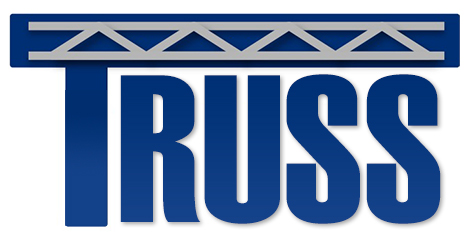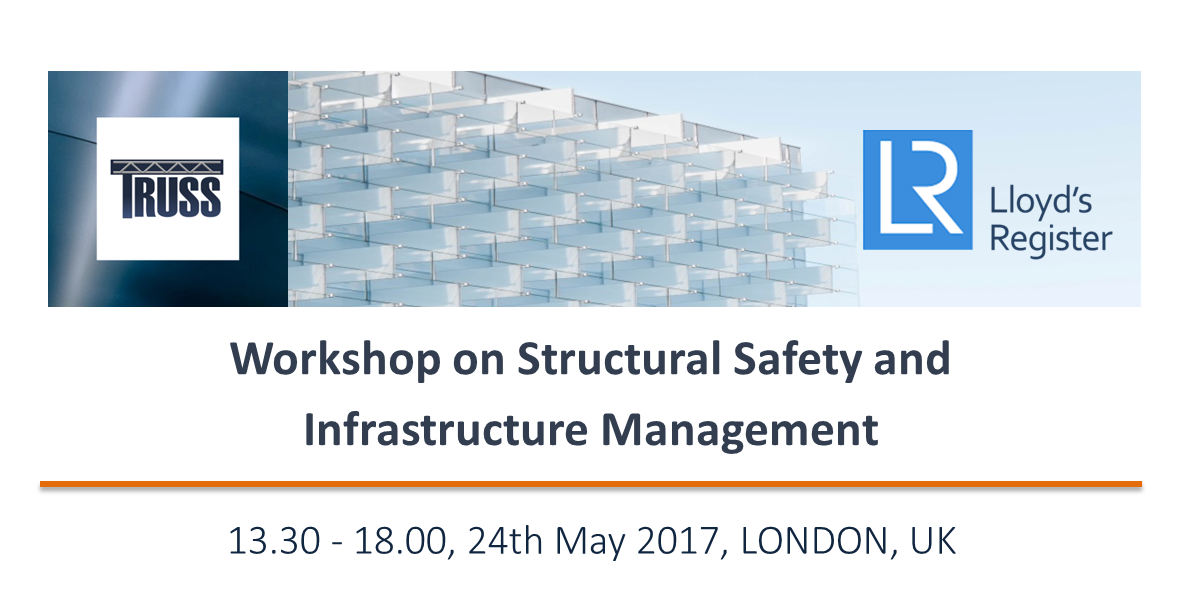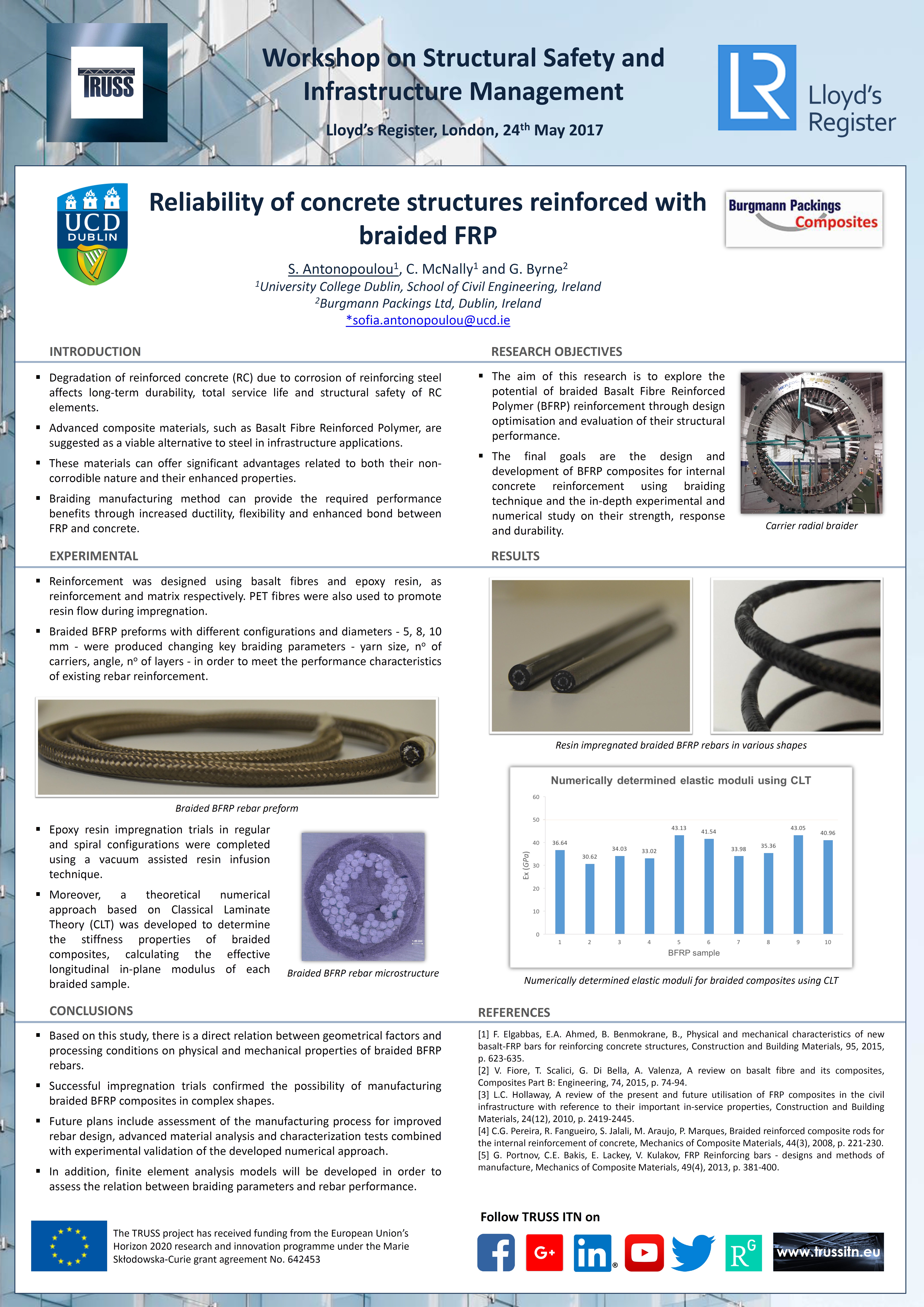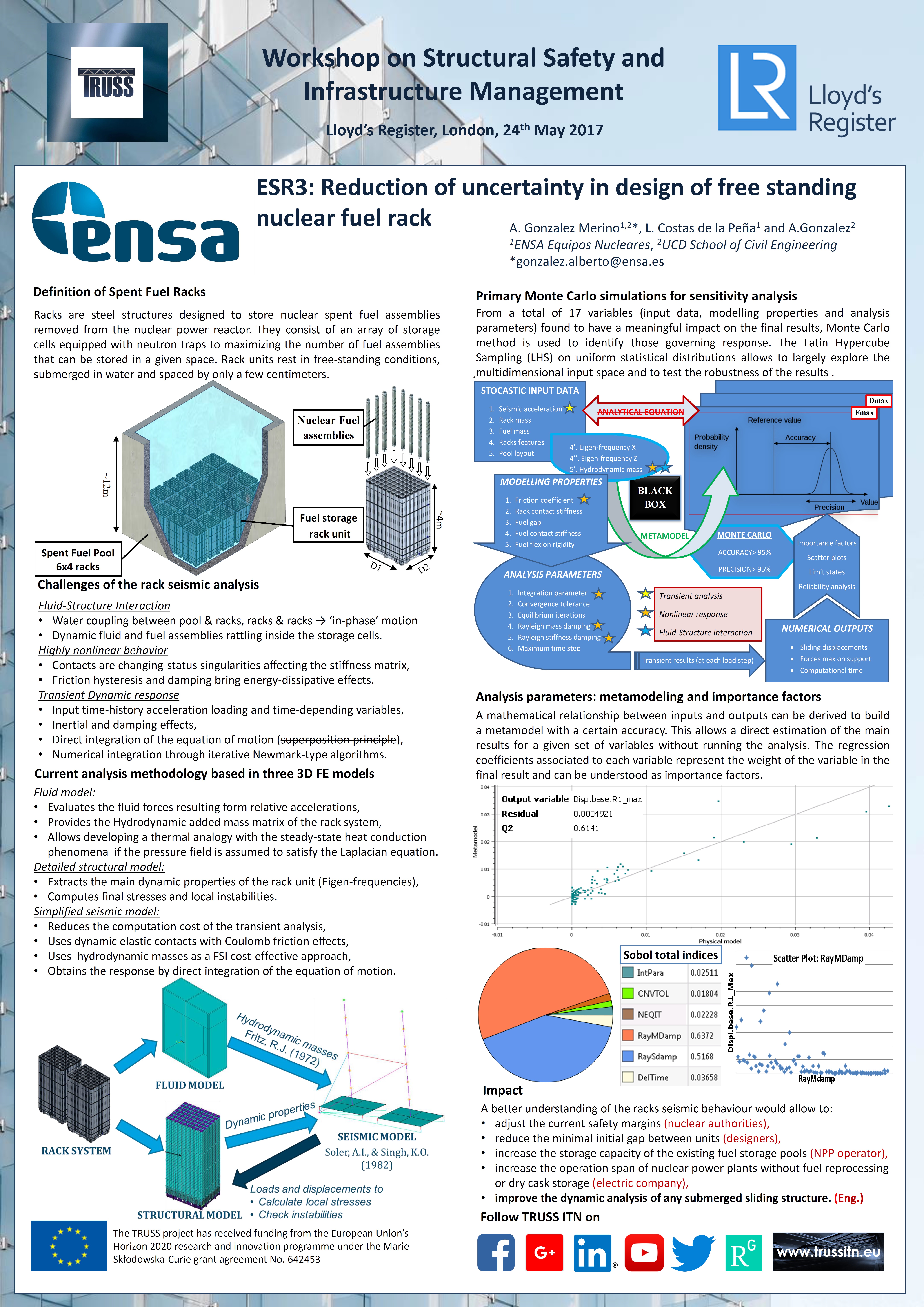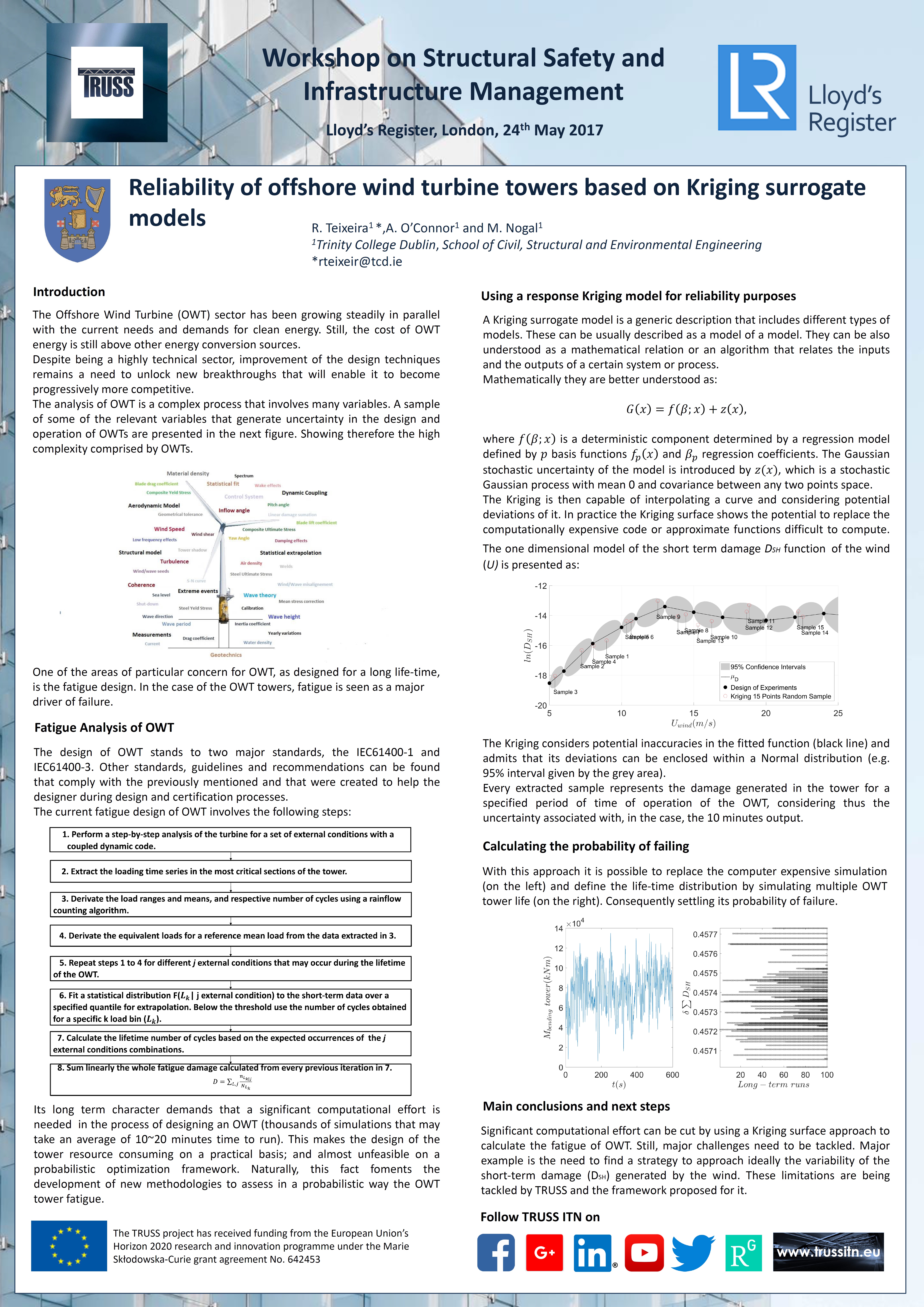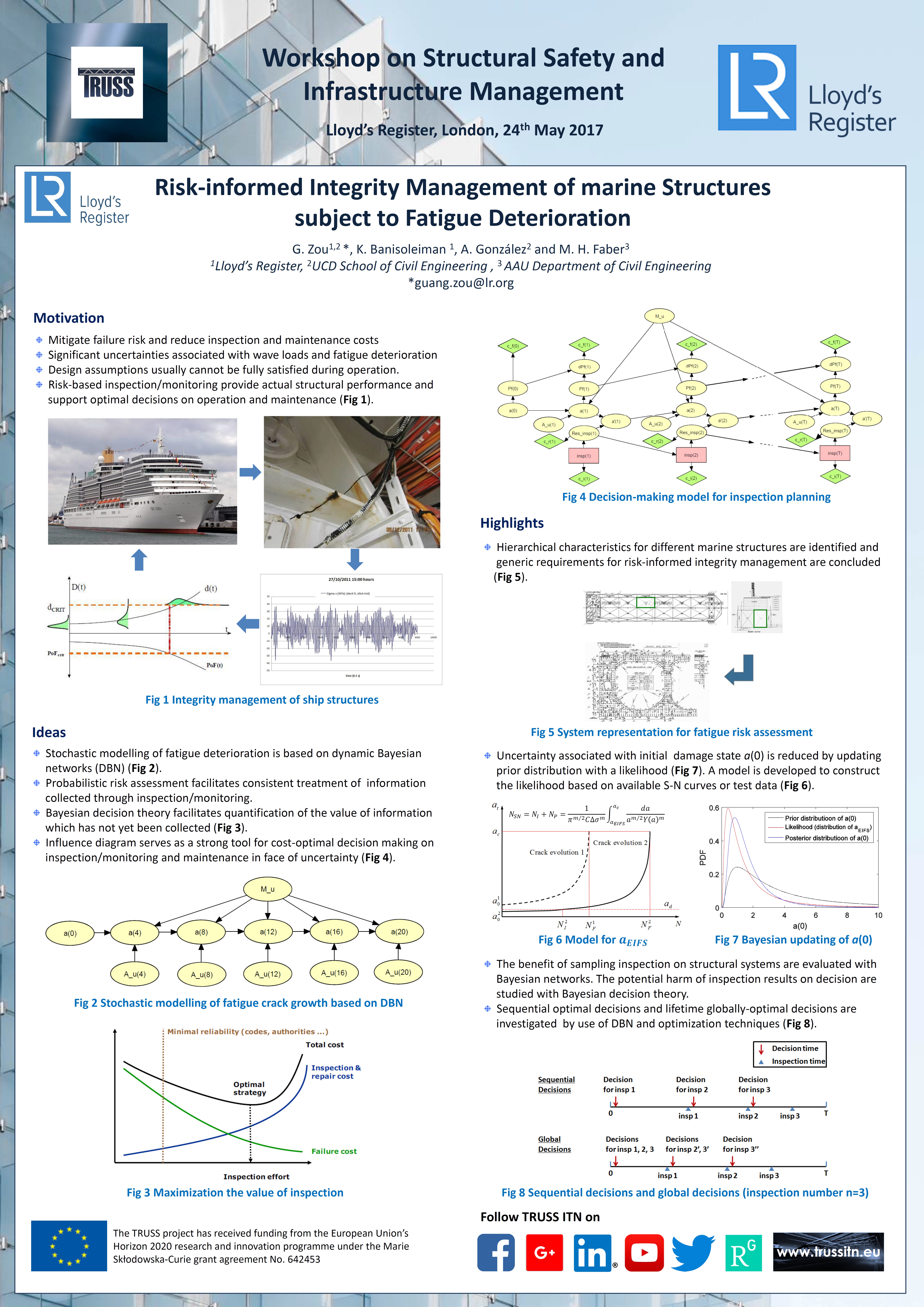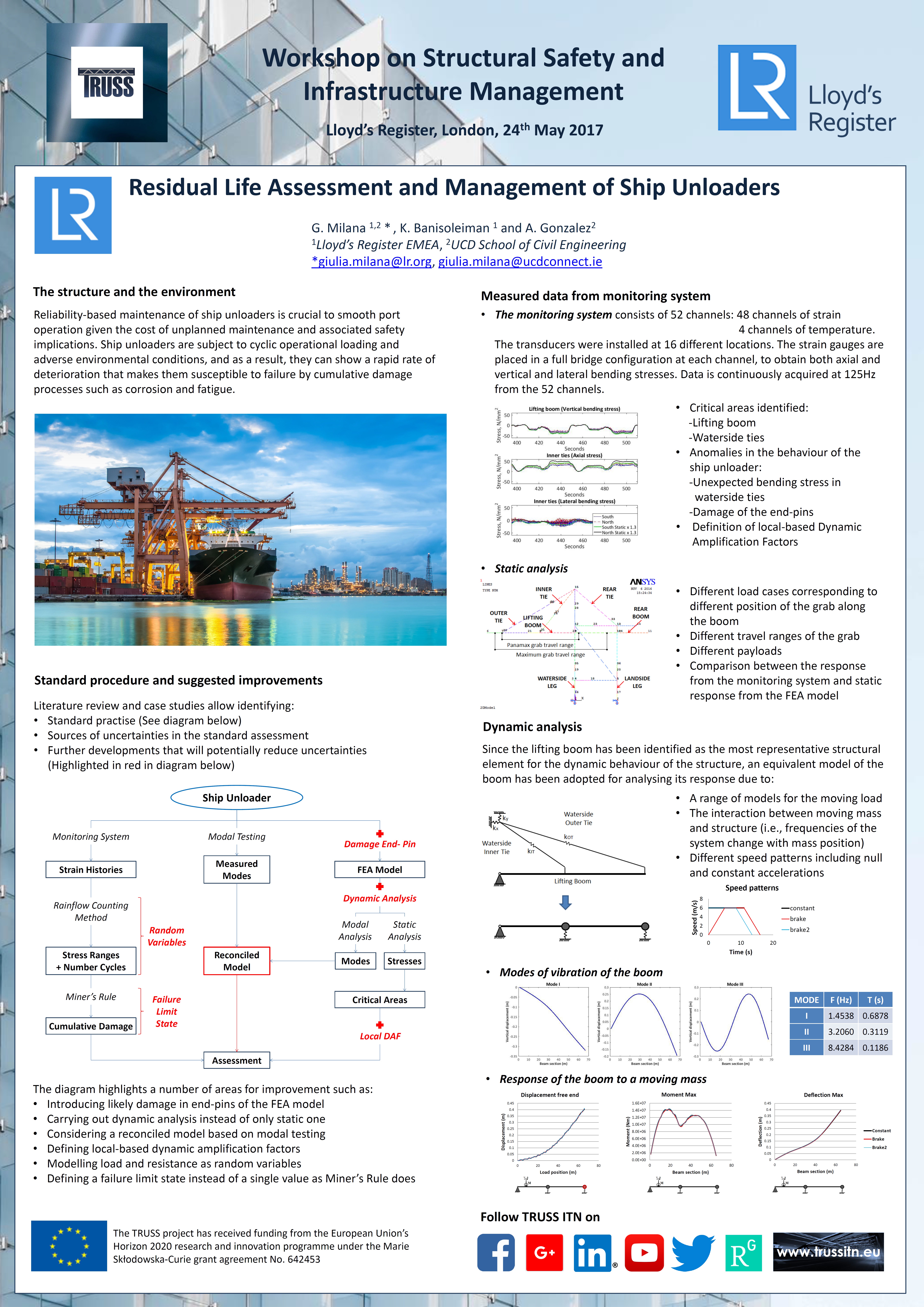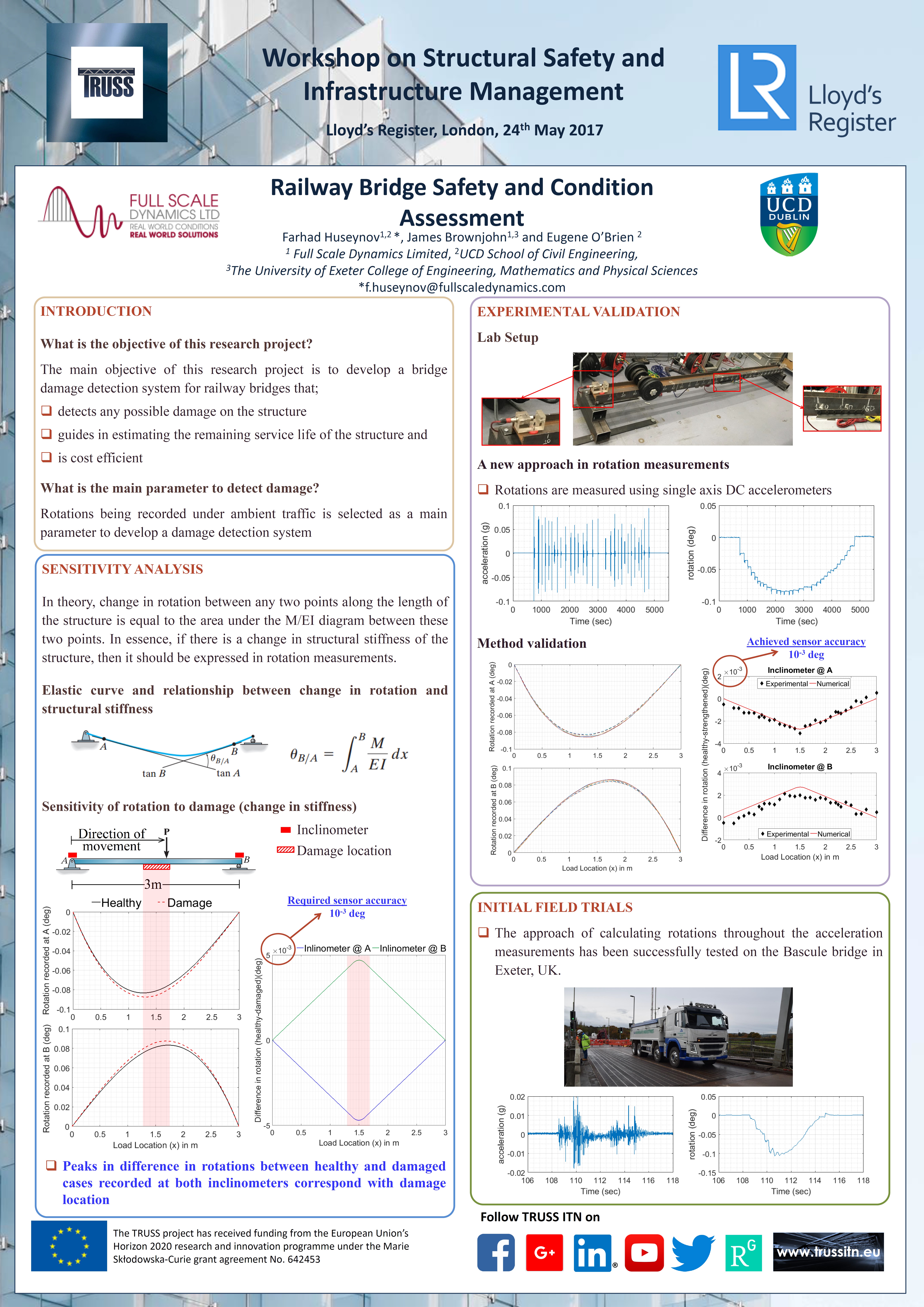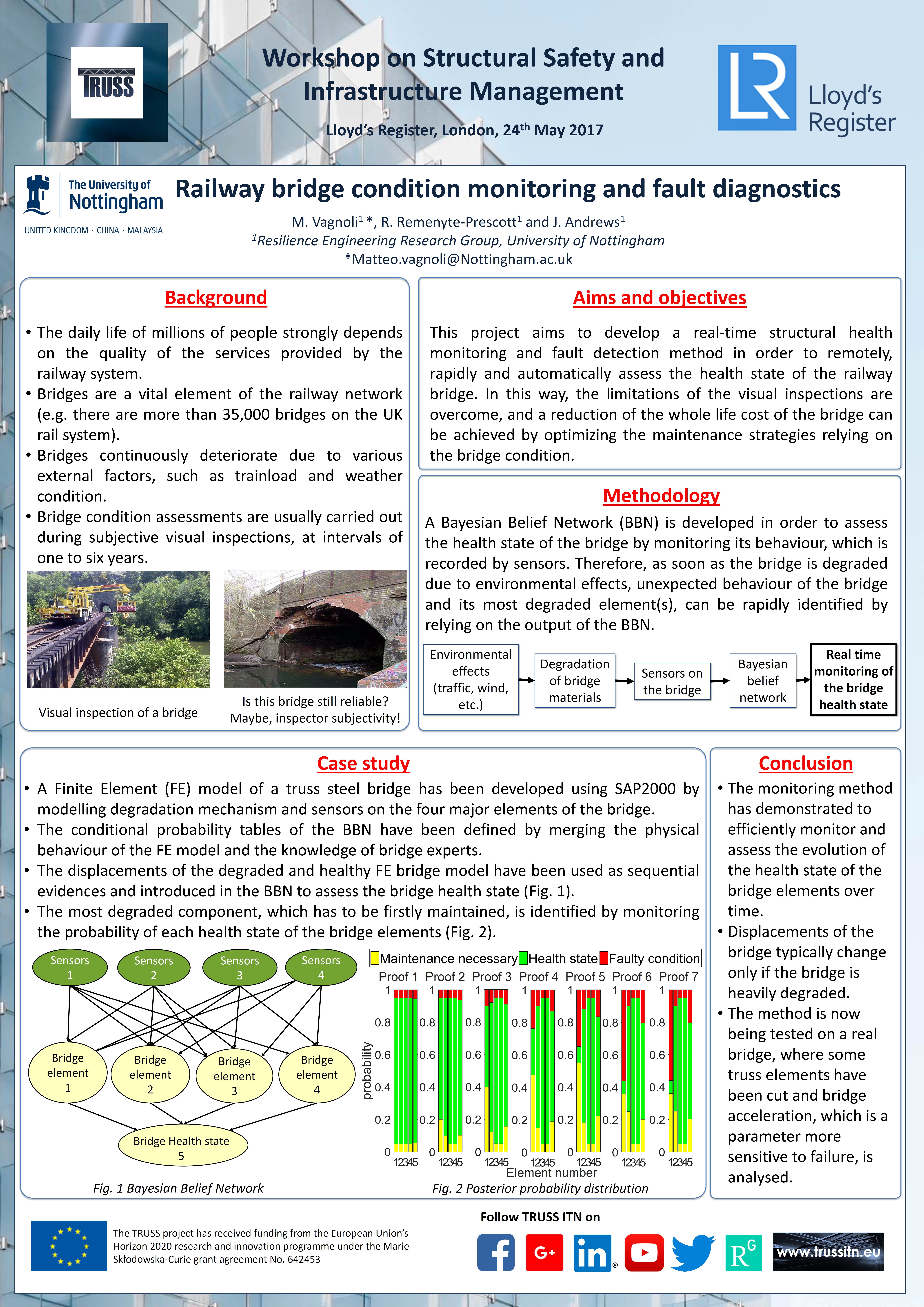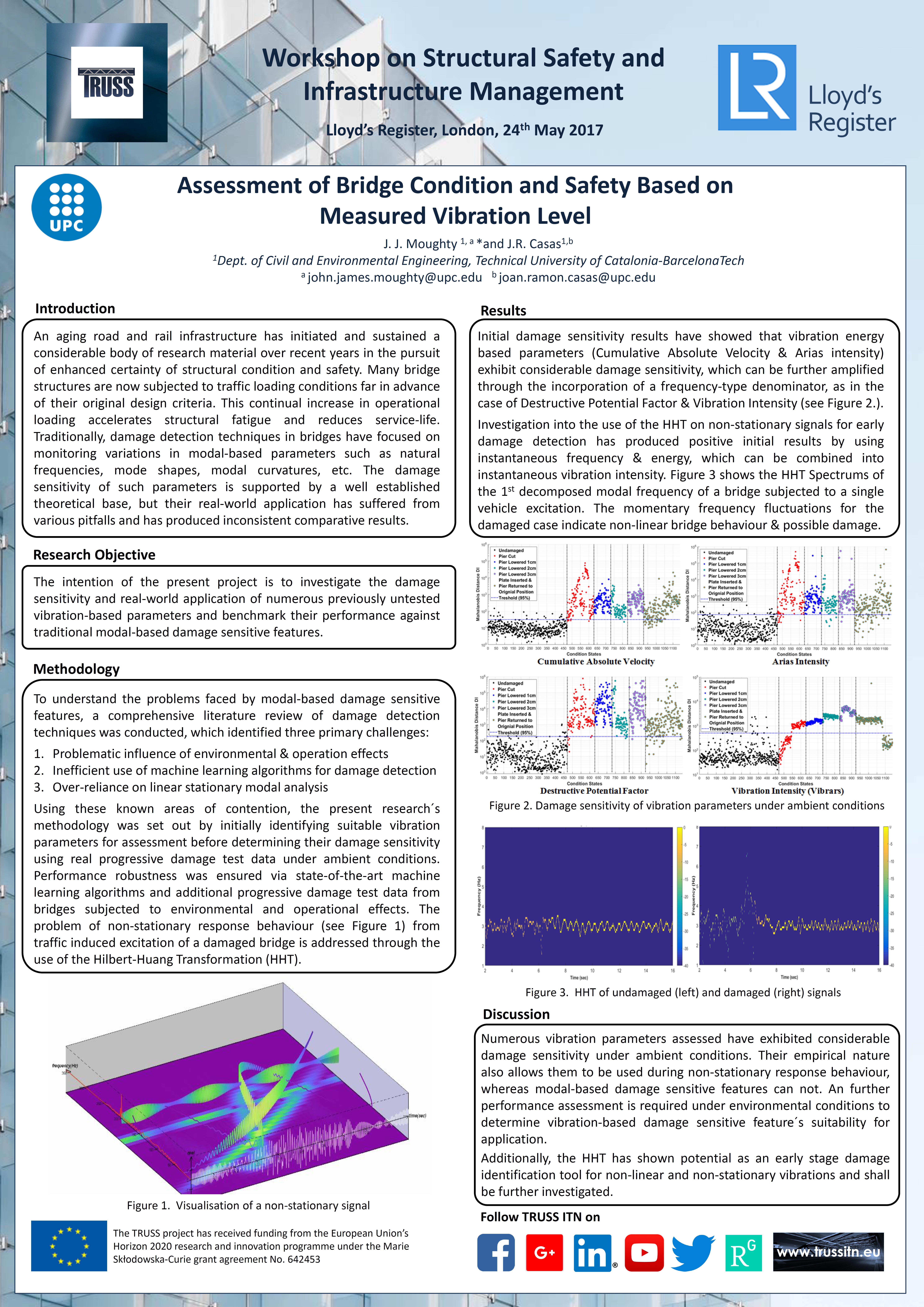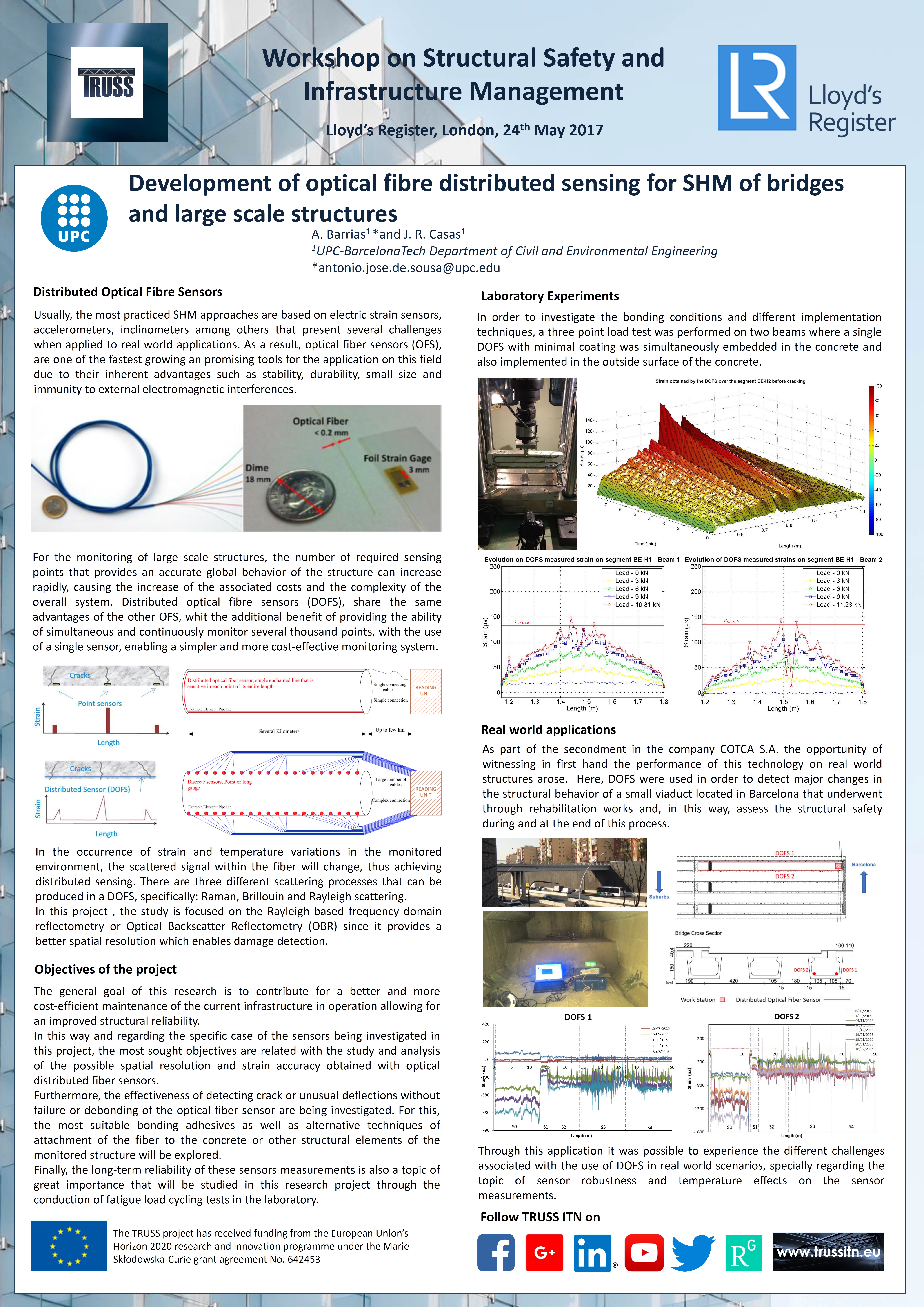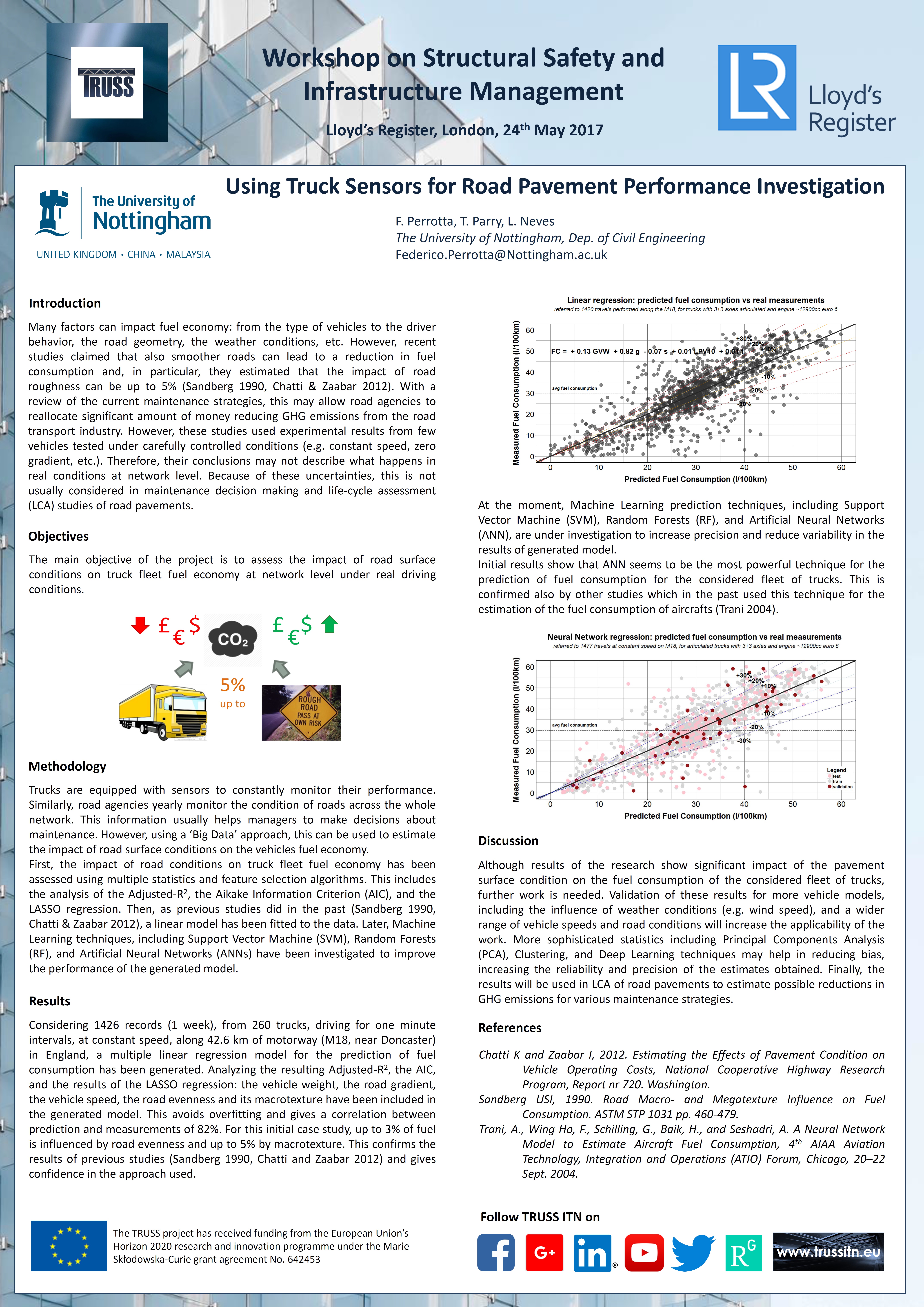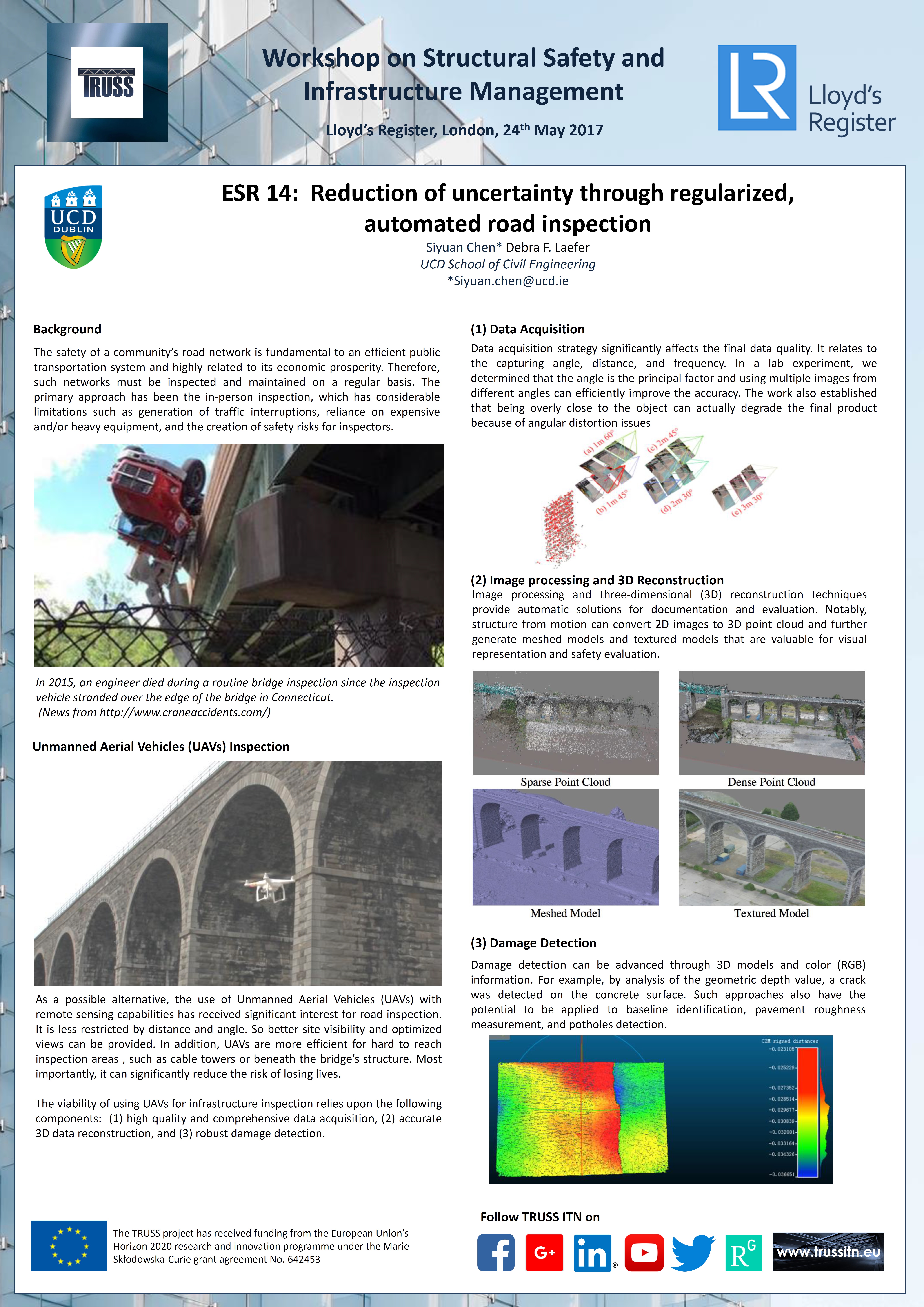Lloyd’s Register is hosting a Workshop on Structural Safety and Infrastructure Management from 1.30 to 6 pm on Wednesday 24 May 2017 at the General Committee Room in 71 Fenchurch St, Central London. This Workshop addresses challenges raised by London Infrastructure Plan 2050, i.e., how to maintain buildings, energy and transport infrastructure that constitute the basic pillars for providing social and economic benefits to a growing London. It features talks by a panel of seven renown experts, discussions and a poster exhibition showcasing fourteen related projects.
Key challenges in managing the increasing demand on London’s infrastructure
The natural consequences of an increasing demand in operational and environmental loads are rapid ageing and deterioration of infrastructure. This workshop reports on current needs of our infrastructure to remain effective and structurally safe, and how monitoring systems and reliability models can contribute to:
- a more efficient infrastructure design, assessment, monitoring and management,
- maintain current infrastructure stock in operation while minimizing risks,
- reduce infrastructure costs and demand for non-renewable and carbon intensive resources while maintaining or improving safety levels.
Target audience
Policy makers, owners, operators, managers, research scientists, engineers and practitioners interested in life cycle maintenance, risk and probabilistic analysis of engineering structures and structural health monitoring.
There is no participation fee associated with the workshop. We encourage you to register early as room capacity is limited to 60 spaces. Places will be allocated on a first come, first served basis.
Please register at: https://workshop_trussitn_lloyds.eventbrite.ie
Schedule
1:30-2:00 Registration, coffee/refreshments and poster exhibition
2:00-2:05 Welcome and Introduction by Mark Stokes (Lloyd’s Register)
2:05-2:25 “Bridge Asset Management at Network Rail” by Robert Dean (Network Rail)
2:25-2:45 “Thoughts about the Risks in Adopting Risk-Based Strategies” by John Dora (John Dora Consulting Ltd)
2:45-3:05 “Resilient Infrastructure: the Role of Structural Health Monitoring” by Prof James Brownjohn (Full Scale Dynamics Ltd and University of Exeter)
2:45-3:05 “Probabilistic Assessment of Bridges – Case Study Presentation” by Assoc Prof Alan O’Connor (Trinity College Dublin and Roughan & O’Donovan Innovative Solutions)
3:25-4:00 Q&A
4:00-4:30 Break for coffee/refreshments and poster exhibition
4:30-4:50 “Decision Theoretical Framework to Offshore Structural Integrity Management” by Prof Michael Havbro Faber (Aalborg University)
4:50-5:10 “Methods and Tools for Reliability Assessment” by Dr Thierry Yalamas (Phimeca Engineering)
5:10-5:30 “Data Centric Engineering“ by Prof Mark Girolami (Imperial College London)
5:30-6:00 Discussion and Closure
About the Speakers and their Talks
 Robert Dean
Robert Dean
Principal Engineer (Structures), Network Rail, UK
Rob Dean is a Chartered Civil Engineer, a Fellow of the Institution of Civil Engineers and Principal Engineer within Network Rail’s Safety, Technical and Engineering team. Rob has over 14 years’ experience in the design and management of structures assets through his work with consultants, contractors and client organisations. Rob currently supports Network Rail’s Head of Structures in leading the development strategies for long term asset management, technology and innovation, future competency requirements and assurance around Network Rail’s structures assets.
Talk on “Bridge Asset Management at Network Rail”
An introduction to Network Rail’s strategic approach to structures asset management. This will focus on the operating context of the UK railway industry and how we manage a broad range of risks to our infrastructure. Download presentation ![]()
 John Dora BSc (Hons) CEng FICE FRMetS FPWI
John Dora BSc (Hons) CEng FICE FRMetS FPWI
Chair of the Infrastructure Operators Adaptation Forum and Infrastructure Expert at John Dora Consulting Limited, UK
John Dora has the rare privilege of being an Engineer who is also a Fellow of the Royal Meteorological Society. With thirty-five years’ experience in flood defence and rail infrastructure, spanning policy to delivery, he leads climate adaptation and resilience research for the GB main line railway. He is somewhat unique in being experienced as a front-line engineering practitioner who works now at policy and strategic levels, using his experience to advise at government level with many links into current science and research programmes. He is a member of the Environment Agency’s Thames Region Flood and Coastal Committee and serves on a number of high-level advisory panels. Recent work includes advising the Paris-based International Union of Railways on adaptation issues, advising HS2 on system interdependencies and climate risks, and chairing the ISO working group responsible for developing ISO14090 – the first International Standard on adaptation. Among past achievements, John was the creative force in the GB main line railway’s research into climate change, and has worked in this area since 2003. He masterminded the current £2.5M programme of world-leading research – TRaCCA and is in active support of this work which features in the UK’s National Adaptation Plan. In wider circles he chairs the national Infrastructure Operators’ Adaptation Forum, was one of the advisors on the UK Government’s update on the National Adaptation Programme and its Climate Change Risk Assessment, and provided the rail evidence for the LWEC (Living with Environmental Change) ‘Report Card’ on transport adaptation.
Talk on “Thoughts about the Risks in Adopting Risk-Based Strategies”
What is risk assessment? A look at risk assessment processes. Quantified v Semi-quantitative v judgement. Limitations of simplistic 5×5 matrix methods and ways to overcome these. Can risk assessment be effective when examining resilience? Dealing with legacy infrastructure – risk based examinations of assets v periodicity based examinations. But that’s a routine, steady state thing – what about resilience, catastrophic risk? Think Malahide Viaduct and its implications on Network Rail…
Risk-based strategies: these can reduce infrastructure costs by focussing on priorities and so reducing demand for interventions – including non-renewable and carbon intensive resources. These strategies can maintain and improve safety levels BUT care needs taken not to ignore low priorities, rare occurrences and residual risk! Tips: Watch out for how ‘risk’ can be a misnomer – scour risk at bridges example where we tend to look at the likelihood of a scour but not the consequences. Watch out for how uncertainties and unknowns can lead to risk-averse decisions – meaning a loss in service performance. We need to be more intelligent here – it’s an old truth that 100% safety can be achieved by stopping everything! Download presentation ![]()
 James Brownjohn PhD FIStructE FIMechE
James Brownjohn PhD FIStructE FIMechE
Director of Full Scale Dynamics Ltd. and Professor of Structural Dynamics at University of Exeter, UK
His research areas include structural health monitoring of bridges, towers and tall buildings; human factors in vibration serviceability; system identification of extreme structures; vibration performance of ultra-low vibration facilities. His current funded research projects are on dynamic performance of offshore rock lighthouses, uncertainty quantification in operational modal analysis and vibration and human factors simulation in the built environment.
Talk on “Resilient Infrastructure: the Role of Structural Health Monitoring”
Following the closure of the Forth Road Bridge, structural health monitoring (SHM) technology provided vital support to engineering staff enabling the bridge to be reopened after a very short time, and was referenced positively in Scottish Parliamentary proceedings. This capability of SHM is potentially the most important application for UK infrastructure likely to affected by degradation or extreme loading. The nature of resilience and the role of SHM are explored using some recent example applications in the UK. Download presentation ![]()
 Alan O’Connor
Alan O’Connor
Associate Professor at Civil Struct & Env. Eng., Trinity College Dublin, and Co-founder and Director of Roughan & O’Donovan Innovative Solutions – RODIS, Ireland
Alan O’Connor is a Chartered Engineer and Fellow of the Institution of Engineers of Ireland. He has extensive national/international experience in infrastructural risk analysis and probabilistic safety assessment. He has advised clients such as: Irish Rail, The Irish National Roads Authority, The Danish Roads Directorate; Danish Railways; Swedish Railways; The Norwegian Roads Authority and The Dutch Ministry of Transport, Public Works and Water Management. At Trinity College Dublin, the research group which he leads are focused on investigating: infrastructural asset management and optimised whole life management, cross asset maintenance optimisation, structural health monitoring, wind engineering infrastructure, stochastic modelling of engineering systems, risk analysis of critical infrastructure for extreme weather events and structural reliability analysis. He has authored over 150 peer-reviewed academic papers in these areas. He has delivered Keynote Addresses at international conferences in Europe, the United States and Australia.
Talk on “Probabilistic Assessment of Bridges – Case Study Presentation”
 Michael Havbro Faber
Michael Havbro Faber
Professor, Department of Civil Engineering, Aalborg University, Denmark
Professor in the area of Risk Informed Decision Support for Structures at the Department of Civil Engineering at Aalborg University, Denmark. Prior to this position he was head of the Department of Civil Engineering from 2011-2015. In the period from 2000-2011 he was tenured professor and head of the group on Risk and Safety at ETH, Zurich, Switzerland. His research interests are directed on decision theory, risk assessment, resilience, sustainability, global catastrophic risks, uncertainty modeling, life safety management, Bayesian probability theory and applied statistics. Application areas include offshore installations, ship structures, bridges, tunnels, buildings, roadway traffic systems and space structures as well as for management of natural hazards.
Talk on “Decision Theoretical Framework to Offshore Structural Integrity Management”
The presentation provides an overview and appraisal of major developments in risk informed structural integrity management for offshore installations together with a discussion of their merits and the challenges which still lie ahead. Starting point is taken in a selected overview of research and development contributions which have formed the basis for Risk based Inspection Planning (RBI) as we know it today. Thereafter an outline of the methodical basis for risk informed structural systems integrity management, i.e. the Bayesian decision analysis, is provided in summary. The main focus is here directed on RBI for offshore facilities subject to fatigue damages. New ideas and methodical frameworks in the area of Value of Information in Structural Health Monitoring, robustness and resilience modeling of structural systems are introduced and it is outlined how these may adequately be utilized to enhance Structural Integrity Management (SIM). Download presentation ![]()
 Thierry Yalamas
Thierry Yalamas
General Manager, Phimeca Engineering, France
He obtained a PhD in Materials and mechanics at Ecole Nationale des Ponts et Chaussées (2004). He was academic visitor at the Centre for Offshore Foundation Systems from 2004 to 2005 when he joined Phimeca Engineering. He has been project engineer, Head of simulations & Uncertainty Engineering Department, Associate Director and currently General Manager at Phimeca Engineering. He has coordinated several collaborative research projects and industrial studies.
Talk on “Methods and Tools for Reliability Assessment“
 Mark Girolami
Mark Girolami
Professor, Department of Mathematics, Imperial College London, UK
Mark Girolami holds a Chair in Statistics in the Department of Mathematics at Imperial College London. He is an EPSRC Established Career Research Fellow (2012 – 2018) and previously an EPSRC Advanced Research Fellow (2007 – 2012). He is the Director of the £10M Lloyds Register Foundation – Turing Programme on Data Centric Engineering and previously led the EPSRC funded Research Network on Computational Statistics and Machine Learning. In 2011 he was elected to the Fellowship of the Royal Society of Edinburgh when he was also awarded a Royal Society Wolfson Research Merit Award. He was one of the founding Executive Directors of the Alan Turing Institute for Data Science from 2015 to 2016 before taking leadership of the Data Centric Engineering Programme at The Alan Turing Institute.
Talk on “Data Centric Engineering”
Address: Lloyd’s Register, 71 Fenchurch Street, London EC3M 4BS, UK

